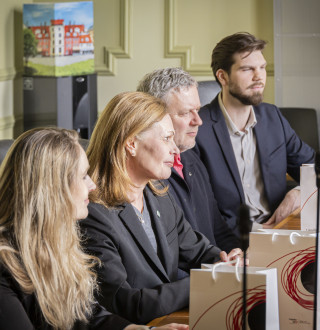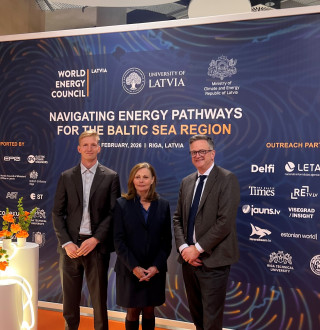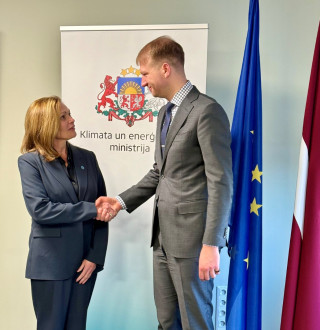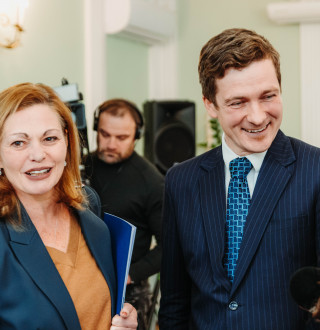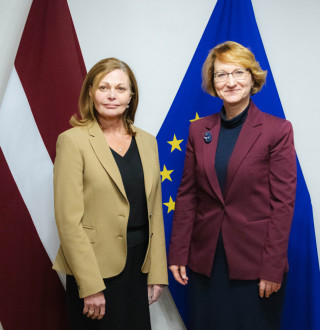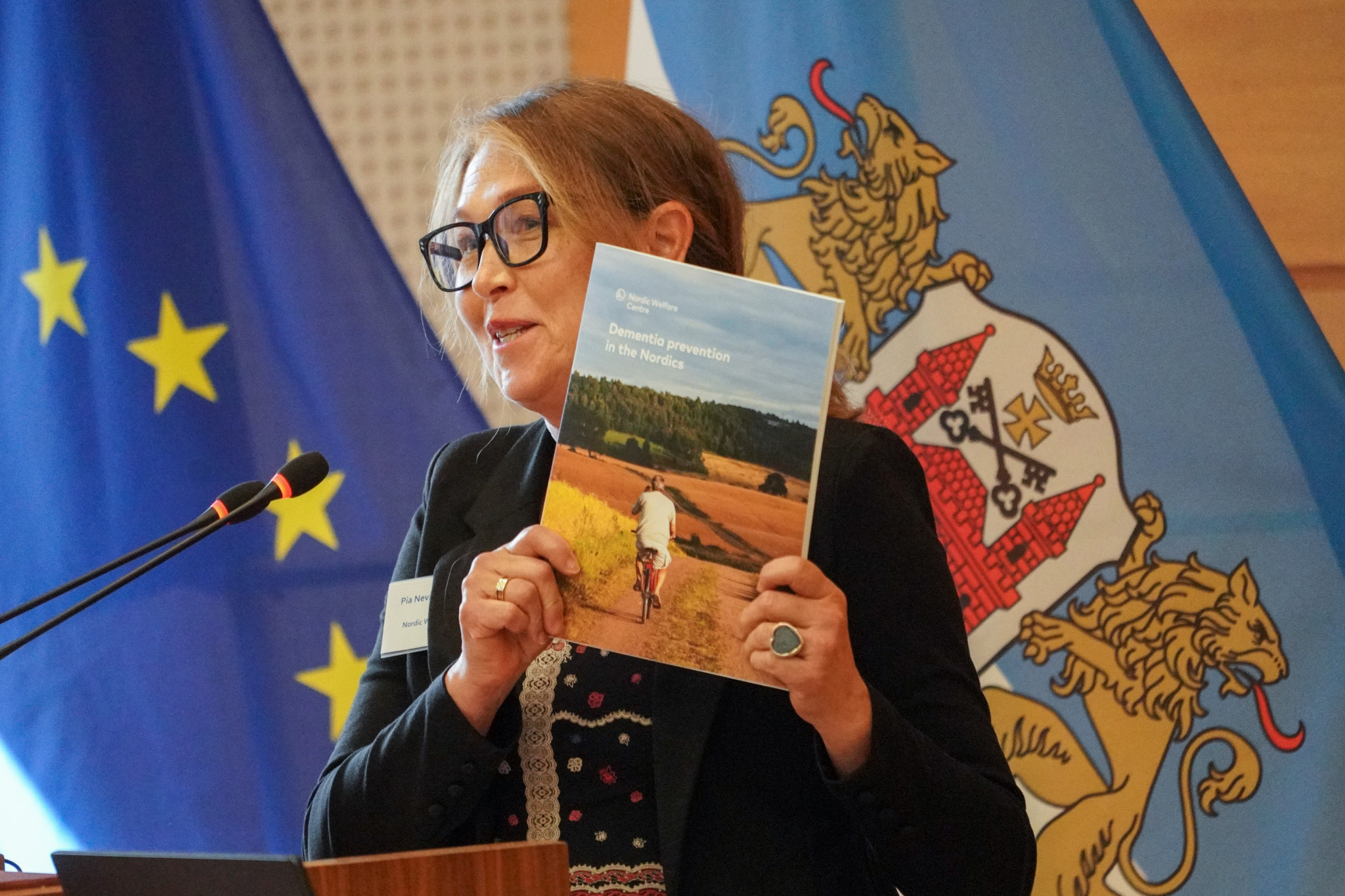Last year on September 30 and October 1, Nordic-Baltic conference on topical issues in the field of societal well-being took place in Riga. The first day focused on dementia, while the second day explored planning of inclusive urban environments for all generations. The event was organised by the Nordic Council of Ministers’ Office in Latvia in cooperation with the Riga City Council Welfare Department.
The two-day forum brought together over 100 participants on site – including social work professionals, policymakers, urban planners, architects, neighbourhood and community activists and NGO representatives – and reached an even larger audience online from across the Nordic and Baltic countries.
Day 1: Support for people with dementia, their relatives and professionals
The number of people with dementia is increasing due to increased life expectancy and is expected to grow by 40% worldwide until 2030 according to the WHO. Many already encounter dementia within their circle of relatives or acquaintances. While the disease is currently incurable, the Nordic countries have gathered forces in researching the potentially modifiable risk factors and exchanging knowledge about the dementia policy and practice. Moreover, there have been promising results through prevention measures, early diagnosis, support systems and innovative care methods. To improve dementia care, fostering cross-sector collaboration and sharing knowledge are essential steps forward.
One of the Nordic partners at the conference was the Nordic Welfare Centre, which has initiated Nordic-Baltic exchange of knowledge and experiences in dementia prevention field during 2024 and recently published a report on dementia prevention in the Nordics to inspire progress. By presenting the FINGER model, Pia Nevala Westman, Senior Advisor at the Nordic Welfare Centre, noted that although effective treatment is still lacking,
“health enhancing environmental factors and healthy lifestyle can contribute to more life years with good cognitive function. Moreover, almost half of the dementia cases can be prevented mainly by delaying the onset of dementia.”
FINGER model is a five-step approach to dementia prevention – one step for each finger.
1. Mental stimulation
2. Healthy food
3. Physical activities
4. Social activities
5. Check cardiovascular values regularly

These steps can help reduce the risk of dementia and policy-driven solutions are important in supporting individuals in choosing healthier lifestyle. It is essential to ensure that healthy choices are accessible to everyone and to raise public awareness to encourage and support preventive actions. Care for individuals of progressing dementia and their loved ones is paramount. Most people suffering from dementia prefer staying at home for as long as possible, which can be supported by offering targeted home care services. The Estonian Competence Centre for Dementia sets an example by an information and trust hotline providing counselling to persons with dementia and their relatives and offering support for healthcare professionals and employees of responsible local municipality structures and healthcare institutions.
Through a 2023 care reform, Estonia has secured funding for general care services, now fully covered by local governments. This allows the Competence Centre organising also support groups led by volunteers and other services such as memory cafés, therapy dogs, crafting workshops and museum trips. Head of the Competence Centre Piret Purdelo-Tomingas stressed the importance of raising awareness about dementia among the general public. The centre has enhanced access to knowledge by publishing two reports on their website – one for people with dementia and their loved ones, and another for professionals and caregivers.
Individuals with dementia and their families undergo a serious life crisis and often experience loss of spirit and hope. When care is not tailored to their specific needs – recognising the diverse nature of this group – these challenges can intensify. A promising support measure is the Circle of Couples – methodology developed in Finland by the “Association for the Welfare of Older Adults” with participants gathering weekly focusing on empowerment, enhancing well-being and developing self-care skills. This constitutes a safe space for sharing experiences and addressing concerns. These groups play a vital role in restoring hope and a sense of continuity of life, significantly reducing anxiety and depression for individuals with dementia and for those taking care of them.
Practicing some kinds of art is another effective approach to maintaining or improving life quality for persons living with dementia. Taking part in cultural activities such as dance, music, literature or going to museums have shown to boost both physical and mental health. The HUNT study – a longitudinal population health study in Norway – has found that individuals actively involved in cultural activities report greater life satisfaction and lower mortality risk. Marit Stranden, Head of the Norwegian Resource Centre for Arts and Health, presented the Music-Based Care (MBC) model for persons residing in long-term care institutions. This model is highly adaptable to individual needs. Moreover, it improves well-being of patients and enhances the working environment for care staff. Stranden emphasises the importance of integrating music into daily routine as it brings comfort, enhances everyday life and fosters a sense of inclusion, identity, purpose and connection.
First day of the conference spurred inspiration among the participants and contained a wealth valuable knowledge for further development of dementia-related services.
Building on this momentum, the second day shifted the focus to age-friendly cities and universally designed built environments and urban spaces, emphasising how inclusive planning and design can foster accessibility and quality of life for people of all generations and of diverse needs.
Day 2: Solutions for inclusive urban environments for all generations
The second day brought together architects, urban planners and architecture researchers with extensive experience in designing inclusive buildings and urban environments. While such designs may be a mere convenience for some, they might be a necessity for others. Universal design does not cater to any specific social group; it focuses on creating services, infrastructure and spaces suitable for everyone. Moreover, thoughtfully designed spaces can foster interaction among people of different generations and thus help reduce the feeling of isolation and loneliness.
Christian Hellevang, Senior Advisor at the Norwegian Association of Local and Regional Authorities, presented an ambitious goal on a national level to achieve universal design by 2025 – creating spaces that promote intergenerational connection and inclusion. He highlighted the importance of participation in municipalities’ networks for the exchange of experience in planning and building in universally designed and age-friendly ways and shared examples of universally designed walking paths made by Norwegian municipalities.
Universal design should not be viewed as mere facilitation, but as an opportunity to create vibrant, inclusive spaces for everyone, as demonstrated by the walking paths that encourage people to stay active in nature. This highlights the value of meaningful activities and proves the notion that inclusively designed environments can motivate people to practice healthy lifestyle despite physical and cognitive incapacity. Christian presented feedback from people walking the paths pointing out essential aspects:
“Going to places where there are other people feels safe” – Vegard Alfsen, 83 years old senior citizen.
“It’s about challenging myself and feeling empowered” – Marianne Brattland, riding in a wheelchair.
Even though the policies in the Nordic and Baltic countries aim to make aging at home possible and comfortable, at the later stages of dementia most persons require institutional care. The need to transition to a long-term care facility may be stressful for some and carries the risk of a decline in quality of life.
Anna Žabicka, a social anthropologist specialising in the anthropology of aging, care, kinship and health equity, and a PhD candidate at the University of Vienna, presented findings and reflections from her fieldwork at a long-term care institution in rural Latvia. Residents of the nursing home shared that they frequently experience boredom and a sense of detachment.
“It’s very calm here. Nothing really happens here. It’s boring. There is nothing to do here. […] When guests would come to my house, they would spend the entire afternoon. I would cook a meal, bake a cake. But here… how long will they sit by the side of my bed with nothing for them or me to do?” – Dzidra, 80+ years old.
This highlights the importance of designing spaces that nurture personal interests and promote social connections. It is crucial to create private spaces in long-term care institutions, which are often in short supply today. Preserving activities and personal interests helps sustain a sense of individuality and cultivates a more private, comfortable atmosphere.
However, for aging at home to be a viable option, buildings must be adapted to universal design principles – a process often hindered by funding challenges and, more importantly, a lack of awareness of the needs of end users. Collaboration with the private sector is essential to making age-inclusive design both affordable and appealing. By working together, we can create welcoming and inclusive neighborhoods for everyone.
To develop age-friendly communities, we must broaden our understanding of elderly citizens and create accessible spaces that fulfil the needs of diverse social groups. This involves designing environments that are versatile, serving multiple functions without signalling a specific ‘age-friendly’, but instead being welcoming to all.
Architect, architecture researcher and co-author of the book “Age-Inclusive Public Spaces”, Dominique Hauderowicz, highlighted the age-segregated nature of our cities, noting that age has become an indicator despite not reflecting an individual’s needs, desires or interests. Key themes in her work include the sensitive and empathetic design of spaces for diverse, multi-use purposes. Some of her key pieces of advice include:
· Make room for existing social life.
· Public life should not always be invented from scratch.
Dominique’s experience shows that the liveliness and chance encounters at locations like supermarket entrances, checkout lines and parking lots serve as vital meeting points for the local community. She emphasised the many advantages of designing our buildings and urban areas in an age-neutral or age-inclusive manner rather than age-specific, encouraging small changes based on user involvement, as “even big goals are achieved by small steps.”
Andis Rinkevics, Head of Crime Prevention Unit of the State Police of Latvia, raised concerns about the security risks associated with making cities more open. This presents a dilemma that must be addressed. To tackle this, the Police of Riga municipality has introduced a handbook on the impact of physical environment on social well-being.
Louise Scheel Thomasen, Senior Advisor at the Nordic Welfare Centre, was promoting the “3-30-300 rule”, which emphasises that individuals should be able to see three trees from their homes, have 30% tree canopy in their neighbourhoods and live within 300 meters of high-quality green space. Sirle Salmistu, senior lecturer at Tartu College of Tallinn University of Technology and partner at the landscape architecture office Outsiders in Estonia shared experience from her research on assessment of age-friendliness of contemporary outdoor places in Estonia and the citizen participation project in Tartu about installing 100 new benches in the city. This project made public spaces more welcoming, improved mobility of inhabitants, enhanced social life and encouraged physical activity, especially for the elderly. Involving the community in such projects is essential for normalizing aging and promoting inclusiveness, activity and a connectedness.
Ira Verma, architect and Senior Scientist in the Research Group for Health and Wellbeing Architecture at the Aalto University in Finland, elaborated on her team’s intention to design with the people, not for the people. By designing for all, cities can respond to the needs of diverse social groups and become better equipped to serve aging population.
In conclusion, the Nordic vision for urban environments emphasizes accessibility, safety, and humanity, where everyone feels comfortable. The core message of universal design is to create inclusive, welcoming solutions, spaces and services for all. To support aging population, we must prioritize medical care, including early diagnosis, person-centred care and self-management skills. Moreover, easy access to greenery and community-based services for people through their lifecourse can make a great difference for the future generations. By working together, we can build cities that foster participation and inclusivity. As our colleague and conference moderator Daina Mežecka underlined,
“Built environment has essential and partly not yet recognised potential for social inclusion and for maintaining our life quality, also when our physical and cognitive capacities decline either because of older age or a sickness like dementia or other. Urban outdoor areas can either support us practicing healthy lifestyle throughout our lives – or become an obstacle for it.
Our cities and countries will benefit from combining the different perspectives of urban planning for child-friendly, age-friendly, dementia-friendly cities and socially sustainable cities and cities for persons with disabilities. Because “if everything we do in our cities is great for an 8-year-old and an 80-year-old, then it will be better for all people”. – I am quoting the initiative “8 80 Cities | Creating cities for all.” In the coming years, we should intensify exchange of the Nordic-Baltic experience on these issues.”
Additional reading:
